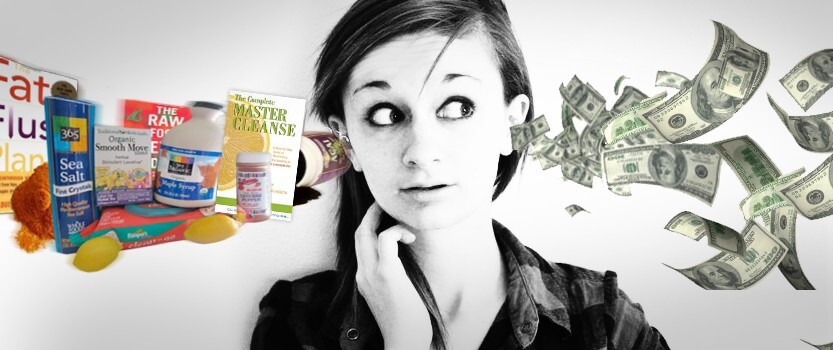

Bad Health Trends
Toxic Cleanse: Debunking Detox Diet Myths
If you are what you eat, when you cleanse, you’re practically nothing.
This article was made possible because of the generous support of DAME members. We urgently need your help to keep publishing. Will you contribute just $5 a month to support our journalism?
Which sounds healthier—a juice cleanse (or detox diet), or eating nothing but white bread and top sirloin for a week?
It turns out the latter is not only more nutritious, but safer. So says Minh-Hai Tran, MS, RD, CSSD, a registered dietitian and owner of Mindful Nutrition in Seattle. “While neither is ideal,” she says, “white bread and lean meat would at least provide enough energy (calories), protein and fat to help your body and mind feel satisfied and energized.” White bread also provides carbohydrates-your body and brain’s main fuel-and, typically, B-vitamins. Meat, meanwhile, provides micronutrients such as iron and vitamin B-12.
Cleanses are all the rage and have been for some time. Modern detox diets date back to the 1940s, when alternative medicine advocate Stanley Burroughs launched The Master Cleanser, a plan promising full-body detoxification by fasting on lemon juice, water, cayenne pepper and maple syrup for 7 to 10 days. The diet gained popularity in 1976 after he released two books: “The Master Cleanser” and “Healing for the Age of Enlightenment.” Never mind that Burroughs had no viable credentials to speak of and was later convicted of medical fraud, his Master Cleanse and other detox diets continue to this day and promise to flush out poisons, purge excess fat, bolster immune function and energy end undesirable food cravings and purify skin. Who wouldn’t want all of that?
In 2007 Americans spent over $28 million on herbal detoxification products. The Master Cleanse juice was the most popular recipe Google-searched that year, according to the University of Southern California. Google searches of “detox products” result in “detoxifying” juices, pills and programs. Add celebrity glam to the mix and the diets’ allure increases. Beyonce Knowles credits the Master Cleanse for her pre-Dream Girls skinny. Lithe actresses Angelina Jolie, Natalie Portman and Gwyneth Paltrow have reportedly followed similar plans. Kym Johnson of Dancing with the Stars touted the Lemonade Diet—basically the Master Cleanse in supplement form. The list goes on, as do the sales.
But the detox diets are not as miraculous as they are popular. According to Tran and many other wellness experts, the opposite may be the case.
Myth #1: Detox diets cleanse your body, ridding it of toxins
“Keeping our bodies healthy is not like a plumbing job where you can just flush out what you don’t want,” says Tran. “There’s no scientific evidence that ‘cleansing’ supplements and juices effectively help the body detoxify.”
From a digestive standpoint, cleansing doesn’t make sense. Healthy organs including kidneys, liver and skin, “do a great job of eliminating everyday toxins,” says Tran. Maintaining organ health requires a balanced diet and nutrients from whole foods—not pills or lemonade.
Many all-natural ingredients in detox supplements, such as psyllium husk, fennel seed and senna, are frilly disguises for “laxative.” Such laxative misuse flushes out valuable nutrients, causes “severe dehydration” and, potentially, “a stretched or ‘lazy’ colon, colon infection, irritable bowel syndrome, and, rarely, liver damage,” says the National Eating Disorders Association. Without enough nutrients and calories, you’re more likely to increase toxicity as your body tries to function on minimal fuel and becomes less efficient at releasing harmful substances.
Myth #2: Detox diets stimulate weight loss
When you under-eat, your body goes into starvation mode—a state in which your metabolism slows down to conserve energy. This makes way for weight gain over time, because a reduced metabolism causes you to burn calories less efficiently. Even temporary restriction can cause permanent metabolic slowdown if you fast routinely. Any immediate weight loss typically consists of water, not fat. And as soon as you eat more normally, the weight will return, likely with added heft due to overeating (who wouldn’t after starving?) or reduced metabolism. Most people don’t starve for long. They start bingeing in no time. While bingeing may quell hunger, it exacerbates those added pounds.
Myth #3: Detox diets boost energy
Detox diets are to the body what a tank half-full of water is to your car. You function slower because you’re lacking necessary fuel. Once your body reaches starvation mode, the fatigue that fasting first caused might dwindle. But this simply means that your body recognizes the starvation. Fasting can also cause your blood sugar to drop and your body to utilize its own tissues for energy. (The term “self-cannibalism” comes to mind.) Other common side effects include reduced sex drive, depressive moods, dizziness, weakness, lethargy and exhaustion.
 Myth #4: Feeling crappy is a good thing
Myth #4: Feeling crappy is a good thing
Supporters of detox diets use the term “healing crisis” to describe adverse symptoms that crop up mid-fast. Many people experience dramatic symptoms that are difficult to endure. In his book, “Beyond the Master Cleanse: The Year-Round Plan for Maximizing the Benefits of the Lemonade Diet,” Tom Woloshyn writes, “When people I have treated call me to tell me they are dying. I reply calmly, ‘No, you are not dying. You are getting better.’”
Actually, you could be dying or at least far from well. And the man “treating” you has no viable credentials to speak of, other than mentorship from Stanley “medical fraud” Burroughs.
Flu-like symptoms, nausea, rashes, vomiting, depression, headaches, pain, anal leakage and mucus buildup could definitely indicate some sort of crisis. But healing? That would require more food and fewer laxatives.
Hazards of colonic irrigation, another fixture of various detox diets, include “illness and death by contamination of colonics equipment and death by electrolyte depletion,” says the National Council Against Health Fraud. “Colonic apparatus can also perforate the intestinal wall leading to septicemia—a very serious disorder.” Dehydration associated with cleansing can also rid your body of electrolytes—electrically-charged nutrients, such as potassium and sodium, which allow for proper heart function.
Myth #5: Detox diets are safe
Aimee Popovich, a 39-year-old Los Angeles homemaker, followed a raw-food-style detox diet, believing that the regime of vegetables, uncooked fruits and water would increase immune function and ease childbirth. At first, she felt fantastic. “I didn’t have to spend time standing over the stove, I could just grab something raw and go,” Popovich told Self in October 2009. “But then I realized something was wrong: I had too much anxiety and a nagging problem with urgent urination.”
She stuck to the diet for five more months, without child, until one day sick, dizzy feelings sent her to bed where she seized and passed out. After her husband phoned 911, she had another seizure, vomited and stopped breathing.
When Popovich came to in a hospital two days later, doctors explained that she’d been undernourished and suffering from kidney failure and brain swelling—results of severe electrolyte imbalances. She gradually recovered and has been eating a far less restrictive diet since.
Detox diets present a host of potentially serious hazards, according to Roger Clemens, PhD, an adjunct professor of pharmacology and pharmaceutical sciences at the USC School of Pharmacy. “The biggest danger is nutrient insufficiency from protracted starvation,” he said. These deficiencies can cause poor immune function, lethargy, skin problems, brittle nails, confusion and sickness. If you yo-yo on and off cleansing plans, shifts in your weight and metabolism can lead to weight gain and obesity-related problems, such as high blood pressure, sleep apnea and heart disease.
The Master Cleanse and other highly restrictive detox plans also throw the body into a state of ketosis, which results from consuming too few carbohydrates. Your body tries to use fat as energy and releases substances called ketones through urine, causing nausea, bad breath, poor brain function and headaches. In severe cases, ketosis leads to coma or death.
Healthy Alternatives
Is there a safer way to cleanse? For starters, eat. This allows your digestive system to cleanse itself. For boosted wellness, turn to whole foods. Eating more fruits, vegetables, whole grains, nuts and fish, and fewer fried foods, refined grains and added sugars, can go a long way.
If you really want to restrict, get rid of toxins you can control—toxic relationships, smoking, those extra alcohol swigs. And next time you’re tempted to cleanse, say these words out loud: anal leakage. Seriously. Is it worth it?
August McLaughlin is a writer in Los Angeles and the executive producer of BodyWise, a series of body image and nutrition-related public-service announcements.
Before you go, we hope you’ll consider supporting DAME’s journalism.
Today, just tiny number of corporations and billionaire owners are in control the news we watch and read. That influence shapes our culture and our understanding of the world. But at DAME, we serve as a counterbalance by doing things differently. We’re reader funded, which means our only agenda is to serve our readers. No both sides, no false equivalencies, no billionaire interests. Just our mission to publish the information and reporting that help you navigate the most complex issues we face.
But to keep publishing, stay independent and paywall free for all, we urgently need more support. During our Spring Membership drive, we hope you’ll join the community helping to build a more equitable media landscape with a monthly membership of just $5.00 per month or one-time gift in any amount.




















































































